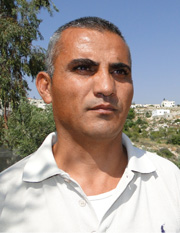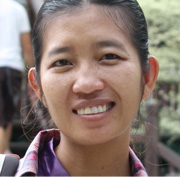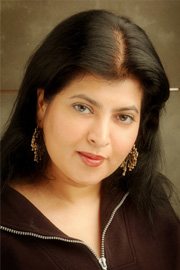The Winners
2010 ALTER-CINÉ GRANT WINNERS
In 2010, the Alter-Ciné
Foundation received 108 documentary submissions from 41 countries.

Emad Burnat, recipient of the $10,000 Alter-Ciné Foundation grant.
|
|
| Emad Burnat, a 39 year-old Palestinian filmmaker, received the
$10,000 award for his project "Five Broken Cameras". |
PROJECT DESCRIPTION
"If you are wounded you will always remember your wound, even after it's healed. But what if you are injured again
and again… you forget your scars. The camera remembers".
It's been five years since my village Bil'in, near Ramallah in the West Bank, began to oppose the wall which Israel built across
our land. During this time I have had five different video cameras, and each one, in different ways, gave its life to the struggle.
Each camera tells a story.
I chose to tell the story from my own perspective, the perspective of a cameraman who persists in filming despite all the difficulties
and threats. This is not just an activist film; the events that I have documented these five years took over my personal life. Just a
few days before the beginning of this struggle, my baby boy Jibreel was born. For me, this symbolizes the connection between Bil'in's
struggle and my own life. My family and me, and my two best friends, we are all part of it.
At first, the soldiers arrested my 11 year-old cousin in the middle of the night. My own children, all of us, were scared that the same
could happen to us. My wife Suraya worries that my filming puts the family in danger. My brothers who take part in the demonstrations
against the wall are arrested and thrown into jail, one after another. My parents try to stop the soldiers, in vain. When my friend
Adeeb is arrested, his 14 year-old son tries to stop the soldiers. Later, it's my turn to be arrested. I'm sentenced to live away from
my home for months, as a way to prevent me from continuing to film.
When I started filming, it was a way of reacting to the reality around me, but soon after, it became a way of survival.
|
|
|

Lida Chan, recipient of a $5,000 Alter-Ciné Foundation grant.
|
|
|
Lida Chan, a 30 year-old filmmaker from Cambodia, received a $5,000 award for her project
"Noces rouges".
|
PROJECT DESCRIPTION
During the Democratic Republic of Kampuchea regime of the Khmer Rouge (1975-1979), 250,000 women were forced into
state-planned marriages.
Today, Pen Sochan, 48, is a poor peasant woman. At 16, she was forced into marriage by the Khmer Rouge leaders in
the village to which she had been deported. She tried to resist but the leaders ordered her husband to rape her. Since then, she has
lived with the shame, confiding in no one.
Finally, Sochan decides to bring her case to the international tribunal set up to try the old Khmer Rouge leaders. But will telling
her story bring her peace of mind? Will her testimony to the tribunal and her meetings with other victims give her hope and confidence
that justice will be done?
"Noces rouges" is the story of a survivor who pits her humanity against an ideology and a system designed
to annihilate people like her.
|
|
|
|

Soniya Kirpalani, recipient of a $5,000 Alter-Ciné Foundation grant.
|
|
Soniya Kirpalani, a 47 year-old filmmaker from India, received a $5,000 award for her
project
"17 Not-Required Indians".
|
PROJECT DESCRIPTION
17 Indian workers in the United Arab Emirates have been sentenced to death for the killing of a Pakistani
worker in March, 2009. Investigation shows that they were tortured, forced to sign confessions, and that
evidence in court was doctored. In June 2010, human rights lawyers revealed the Indian Embassy's darkest secret:
1730 Indian citizens working in the UAE languish behind bars, approximately 300 on death row! The sentencing patterns
are strange -- 16 men on death row for murder of one; eight men for murder of another. But the Indian Embassy
refuses to intervene. For the UAE, a nation where eighty percent of the residents are expatriates who live in harmony
with the twenty percent who are citizens, these cases are a challenge to justice.
Using two interwoven story lines, one shot in UAE, the other in India, the film follows the trial through contradictory views,
revealing a poker game where the jackpot is truly 'life or death'. Two brothers of the accused, trying to build proof of innocence,
take us into labour camps, where we discover a dark side of UAE society. Visiting with the workers' families in India we discover their
struggle to get by. Pyarelal, a 70 year-old English tutor, whose daily life is a battle against poverty and his loss
of eyesight, now struggles to save his son. Ranjeet Kaur, a 24 year-old uneducated housewife, stands up to politicians
and begins a campaign to save the men. Finding strength in numbers, these people keep the case alive between trials.
|
|
|
|
|